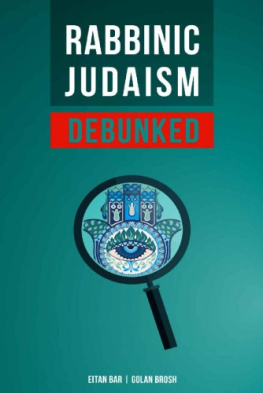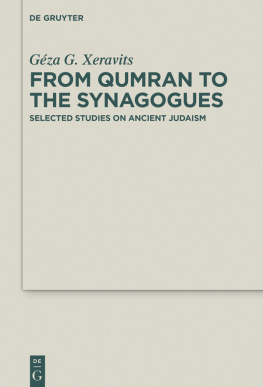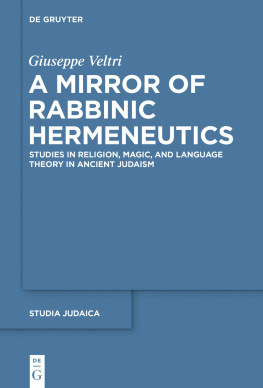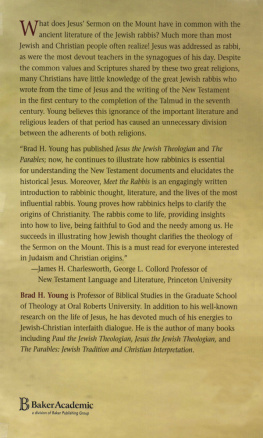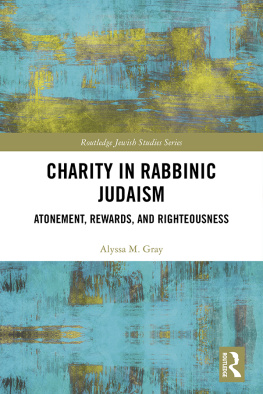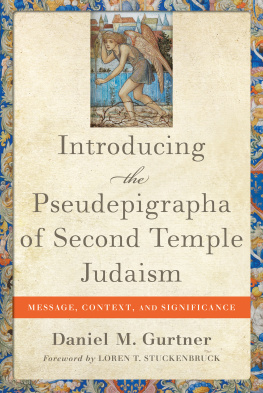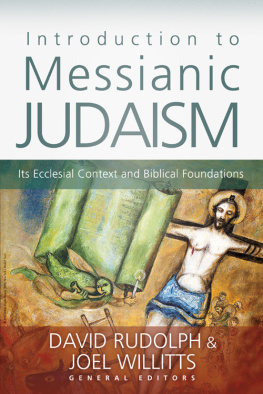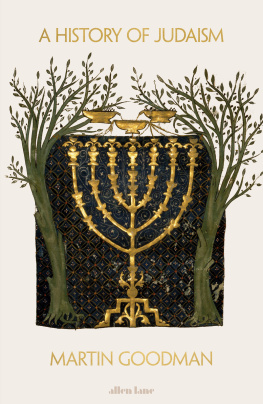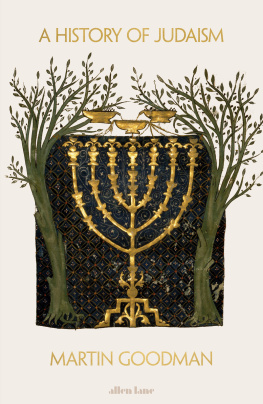RABBINIC JUDAISM DEBUNKED
~ Debunking the myth of Rabbinic Oral La w ~
Dedicated to all other Jewish believers in Yeshua
ISBN : 9781793227560
Copyright 2019
Dr. Eitan Bar (ABD),
Dr. Golan Brosh (ABD)
Published by: ONE FOR ISRAEL Ministry
(www.oneforisrael.org)
All rights reserved. No part of this publication may be reproduced or transmitted in any form or by any means, electronic or mechanical, including photocopying, recording, or any other information storage and retrieval system, without the written permission of ONE FOR ISRAEL Ministry. Unless otherwise indicated, all Bible quotations are from the ESV Bible (The Holy Bible, English Standard Version ), copyright 2001 by Crossway, a publishing ministry of Good News Publishers. Used by permission. All rights reserved.

CHAPTER 1
Chapter 2
Chapter 3
Chapter 4
Chapter 5
CHAPTER 6
Chapter 7
Chapter 8
Chapter 9
CHAPTER 10
Chapter 11
Chapter 12
Clicking this flourish at the end of each chapter
will return you to the table of contents.
Introduction
The intention of the authors of this short book is to present a vigorous critique of traditional-rabbinic Judaism. It should be clearly stated at the outset, however, that this critique is offered in the context of an intramural discussion between Jews who believe in Yeshua (Jesus) and those who do not yet follow Him. It should not be understood as an attack on the Jewish people, but rather as a dispute between different sects within Judaism, over the true interpretation of the Tanakh and the authority thereof.
This papers main objective will be to examine the validity of the following premise: for two millennia Judaism has been held hostage under the government and philosophy of one distinct sect, namely the Pharisees and their heirsthe rabbis. Since the destruction of the Second Temple, biblical Judaism had ceased to exist and the rabbinic traditions took over, with a completely reformed version of Judaism which centered on three main pillars: the rabbis themselves, the yeshiva ( ) and the Halacha ( ). This work will also try to examine how this sect managed to enforce its traditions upon Israel and at what cost.
In order to establish their authority over the Jewish people, the rabbis came up with the revolutionary idea according to which their philosophy, traditions and teachings (i.e., the Oral Law) were passed on through the generations, beginning with Moses and ultimately with God Himself.
Other main objectives of this paper would be to historically examine how the sect of the Pharisees was able to attain such a stronghold over Judaism, to investigate whether the Oral Laws traditions are in fact rooted in the Bible and genuinely reflect Gods will for men, and to examine the implications of the Oral Law on Judaism today, especially in regard to Israel's relationship to the New Testament and Yeshua. The first chapter of this paper will deal with the advent of the Pharisees and the circumstances which brought them into the position of authority.
Chapter 1
THE ANCESTORS
OF THE RABBIS
F or over a millennium, Judaism has been identified with the rabbinic traditions and vice versa.
Rabbinic literature documents four categorical obligations which a member of the Pharisees had to commit himself to keep:
; ; ; .
Meaning: Not to give donations and tithes to the people of the land;
In the time of Herod the Great,
Chapter 2
GAME OF THRONES
U ltimately, it was a question of authority over the people Israel. But the power struggles between the two sects started earlier.
A testimony to the fierce dispute between the leading sects of the Second Temple Period, is found in the Dead Sea Scrolls, where it is said about the Pharisees:
.
Meaning: deceivers of Ephraim, which by their lies of teaching, tongue of falsehood and language of fraud will mislead many. The leader of the Pharisees is described by the Dead Sea Scrolls as the preacher of deception ( ) and the man of mockery ( ) and he is accused of misleading many with his deceitful teachings,
The ancient historian Yosef ben-Matityahu (Josephus Flavius) reinforced this when he wrote that the Pharisees commanded Israel with traditional laws which were never a part of the written Torah, or written Law and therefore, were rejected by the Sadducees, who argued in favour of sticking to the text alone. In response, adds Josephus, fierce arguments and disputes broke out between the two sects.
Josephus, along with several rabbinic writings, document the political rivalry between the King Alexander Yanai
It was Queen Shlom-Tzion (known also as Alexandra)
At that point, the rivalry between the Pharisees and the Sadducees had been revealed in all its severity. Josephus wrote that Queen Alexandra gave the Pharisees full authority over the people and renewed all their traditional rulings (which had been abolished earlier by Hyrcanus, her father-in-law).
The Pharisees were the biggest opponents of the Sadducees priesthood. In one instance they deliberately defiled a certain priest so he could no longer bring sacrifices; in another instance they ordered the stoning of a priest who dared to go against their teachings; one priest is even recorded saying that even though they, the Sadducees, had responsibility over the Temple, they still feared the Pharisees. Indeed, the Pharisees rejected and dismissed many of the procedures under which the Sadducees operated and enforced new traditions, to which the priests would have to be subject.
After the Second Temple was destroyed, the Pharisees at last had the opportunity to implement their religious revolution, to create a national body which did not need a specific physical location to stand on
In sharp contrast to the priests, the Pharisees denied both the dynastic system upon which the Sadducees inherited their authority and their source of authority for divine knowledge. They rejected the exclusivity of the Sadducees as priests who served in the Temple. The rabbis also declared that prophecy had ceased to exist and the writings made by the priests were therefore null and void.
With the advent of the Oral Law, which was based on human reasoning, the Pharisees managed to push aside many of the values that had been reflected in the old priestly order. The rabbinic tradition was exempt from any sacred boundaries and thus had no preconditions; by using principles such as laws of Moses from Sinai ( ) or after many, turn ( ), the Sages ( " )
The rabbis finalized their religious domination by imposing severe censorship over the Bible through an interpretation by methods which would suit their agenda and further establish their authority. By the end of the first century AD, their victory over prophecy and priesthood was accomplished, and there was no turning back for nearly two millennia.
It seems as if the destruction of the Second Temple gave the Pharisees exactly the opportunity they had hoped for. Take Jerusalem, but give me Yavne and its scholars,
The Temple, it seems, was sacrificed upon the altar of tradition!
From here on, Judaism was total dependent upon the rabbis and their Oral Law; the Pharisees reformation was completed. Judaism was in their hands.
Chapter 3
THE ADVENT OF THE ORAL LAW
T he myth of an Oral Law having divine authority was not made unintentionally. On the contrary, it was a direct method by which the rabbis could keep themselves as the ultimate source of knowledge and thus create total dependency on their teachings alone.
In a paradoxical way, the Oral Law refers to all the writings made by the Sages, both Halacha (rabbinic law) and Agada (rabbinic legends and Midrash). In fact, the paradox is even greater, because there is probably no other religious sect in the world which has such a vast Oral Law literature as the rabbinic tradition. According to the Sages, the Oral Law was not created in the Second Temple Period, but was only developed and established by the rabbis following that period; In fact, the Sages took it one step further, and argued:
Next page
